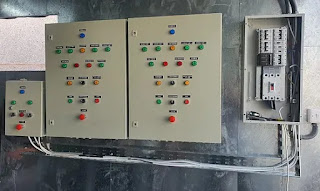Control Panels
Control Panels: A Critical Component in Modern Systems
Control panels are integral components in various industries, serving as centralized hubs for managing and controlling machinery, electrical systems, and processes. They ensure smooth operations, safety, and efficiency in industrial, commercial, and residential applications.
Definition and Functionality
A control panel is an enclosure housing electrical and electronic components, such as switches, relays, circuit breakers, and programmable logic controllers (PLCs). These components work together to regulate and automate system operations, monitor performance, and protect against overloads or faults.
Applications of Control Panels
Control panels are used across various sectors, including:
- Industrial Automation: Managing complex machinery in manufacturing processes.
- Building Management: Controlling HVAC, lighting, and security systems.
- Renewable Energy: Operating solar energy systems, wind turbines, and energy storage solutions.
- Water Treatment: Monitoring pumps, filtration units, and chemical dosing systems.
Types of Control Panels
- Motor Control Panels: Designed for controlling and protecting electric motors.
- Power Control Panels: Regulate and distribute power in large facilities.
- Automation Panels: Incorporate PLCs and HMIs (Human-Machine Interfaces) for complex control tasks.
- Custom Control Panels: Tailored for specific applications, combining standard and specialized components.
Key Components
- Control Devices: Switches, push buttons, and touchscreens.
- Protective Devices: Circuit breakers and fuses to prevent damage.
- PLC and HMI: For automation and user interaction.
- Wiring and Terminals: Ensure secure and efficient connections.
Benefits of Control Panels
- Increased Efficiency: Streamlined operations and reduced downtime.
- Enhanced Safety: Protection against electrical faults and hazards.
- Scalability: Adaptable to growing operational needs.
- Integration: Can be linked with IoT systems for real-time monitoring and control.
Advancements in Control Panel Technology
Modern control panels are becoming smarter and more efficient with advancements such as:
- IoT Integration: Enabling remote monitoring and control.
- Energy Efficiency: Utilizing energy-efficient components to minimize power consumption.
- Modular Designs: Allowing for easier maintenance and upgrades.
Control Panels in Water and Energy Sectors
Control panels play a significant role in water treatment and energy systems. For example:
- Water Treatment: They automate processes like filtration, pumping, and chemical dosing to ensure water quality.
- Energy Systems: They regulate power flows in solar energy installations and manage battery storage systems.
With their critical role in ensuring operational efficiency and safety, control panels remain an essential component in both traditional and modern systems.

تعليقات
إرسال تعليق